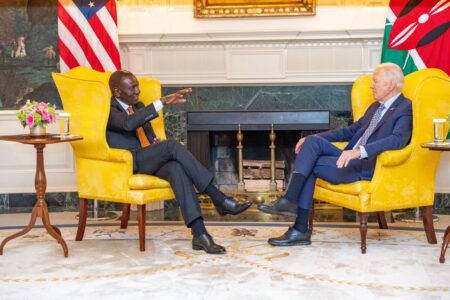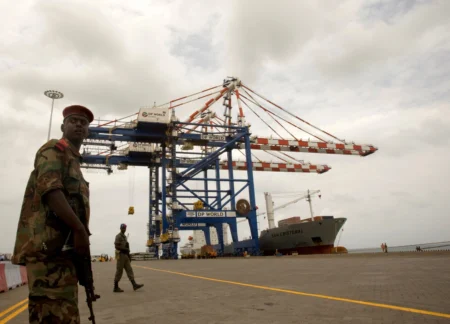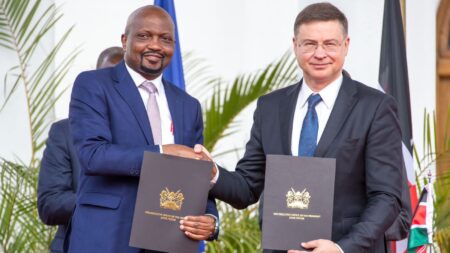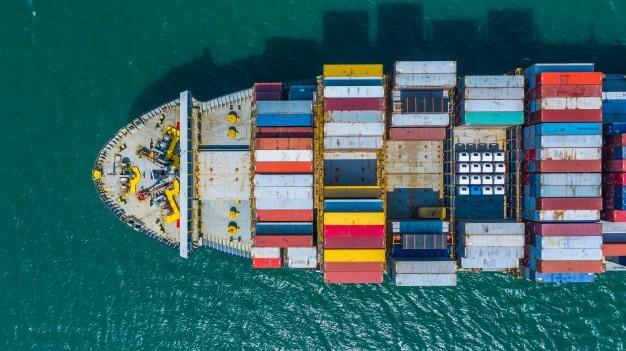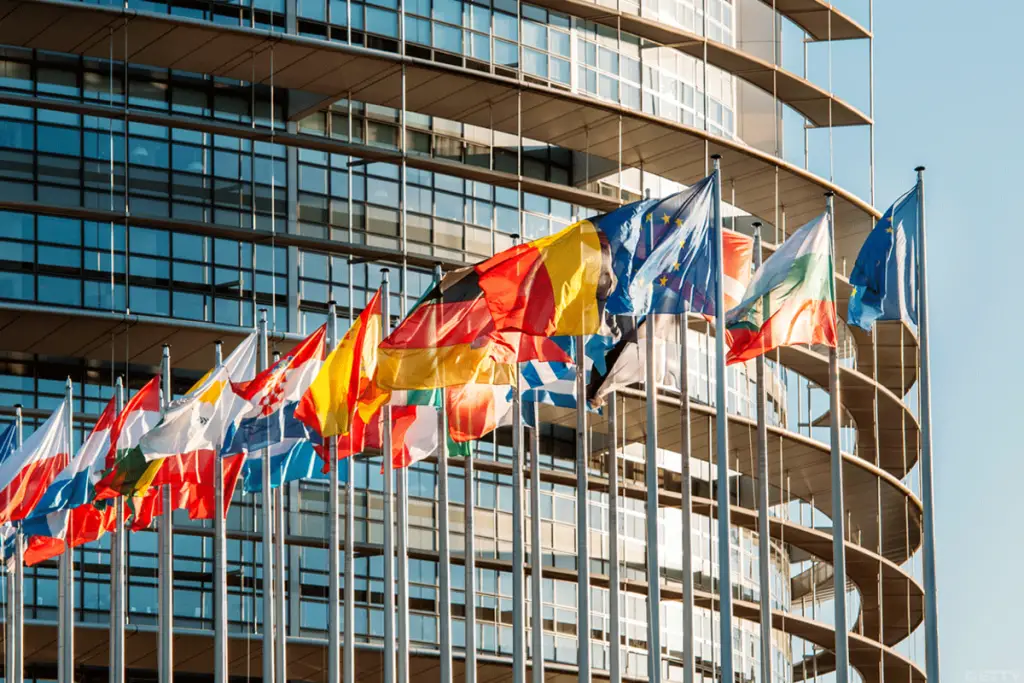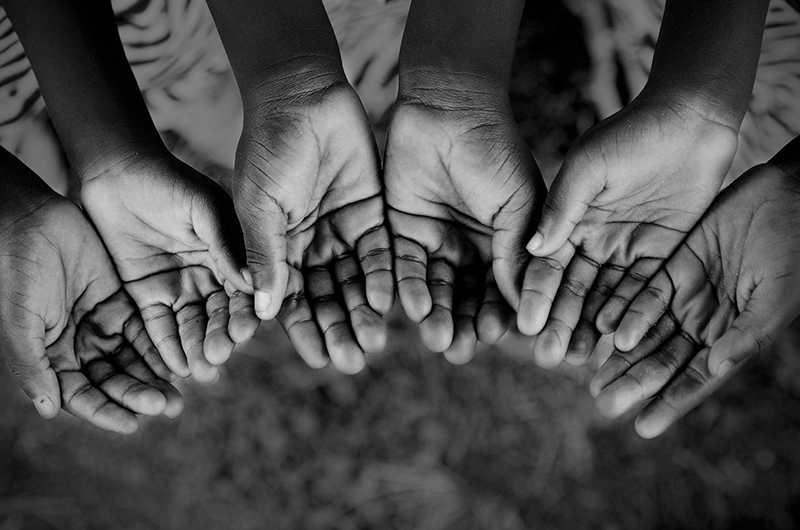- Africa’s new dawn: the rising role of digital and AI in agriculture
- Can Dangote Refinery Transform Africa Energy Ambition
- Gallup Survey: 80 per cent of Kenyan Workers Are Disengaged and Seek New Opportunities
- Madagascar Man Freed from 5KG Tumor After 15-Year Struggle
- How women in Africa are perceived and treated
- Sugar consumption in Kenya to Increase to 1.23 Million Tonnes
- Can Somalia and Turkey Oil deal Bring Change in Somaliland
- Remittances to Kenya dropped to $371.6 million in June, marking a six month low
Browsing: European Union (EU)
- In the first three months of this year, Asia remained the leading source of Kenya’s imports accounting for goods worth $3.4 billion, as the country’s import bill closed the quarter at $5.4 billion.
- Kenyan traders and government imported goods worth $990.2 million from China, data by the Kenya National Bureau of Statistics (KNBS) shows, making it the biggest import source by country.
- Unlike his predecessors, President Ruto is seen to lean more towards the West as he seeks financing and trade cooperation.
Kenya’s imports from Asian countries including China
China and India remained the top exporters to Kenya in the first quarter of this year, leading other Far East nations in retaining a firm grip on the East African economic powerhouse’s trade and investment space, which they have dominated for over a decade.
This trend continues despite President William Ruto’s heightened charm offensive to economies from the West, which is …
-
- Energy industry experts and policymakers are meeting in Nairobi for the International Energy Agency 9th Annual Global Conference on Energy Efficiency, the first time the conference is being hosted in Africa.
- European Commissioner for Energy Kadri Simson and Kenya’s Cabinet Secretary of Energy and Petroleum Davis Chirchir launched the Green Resilient Electricity System Program for Kenya.
- The Green Resilient Electricity System Program will support Kenya’s goal of a complete transition to 100per cent clean power generation by 2030 and it will boost Kenya’s sustainable energy future.
The green energy economy strategy seeks to build on the country’s current economic strengths to secure a more sustainable future. Kenya’s ambitious plan to fully transition to 100 per cent clean power generation by 2030 has received a major boost, with the European Union backing the initiative.
This comes as leaders, energy industry experts, and policymakers meet in Nairobi for the International Energy Agency’s
- The EU is supporting efforts in the Horn of Africa that will boost regional economic integration and trade.
- Djibouti’s major trading partner countries include Ethiopia and troubled Somalia.
- Trade Mark Africa is helping implement a single window system which is already in use across EAC.
The EU has expressed its support for Djibouti’s plan to enhance connectivity within the Horn of Africa, a move that will promote trade with Ethiopia, one of the region’s biggest trade partners.
This collaboration is in sync with the African Alliance for e-commerce, a consortium comprising 18 member countries, dedicated to advancing the Single Window concept. This alignment adheres to the recommendations set forth by international institutions.
A pivotal project within the Alliance is the establishment of a Regional Single Window, designed to seamlessly interconnect all national platforms. The overarching goal is to streamline trade processes, bolstering the competitiveness of African nations on the global …
- Kenya will progressively allow more imports from the EU into its market.
- An EU official terms the trade agreement with Africa’s seventh largest economy “a partnership of equals”.
- Under the Kenya-EU trade deal, Nairobi’s exports to European bloc will be tariff-free from day one.
A new Kenya-EU trade deal will see Nairobi’s exports to the European bloc enjoy tariff-free status from day one, while tariffs on EU exports will be liberalised over time but not on all products. The Kenya and European Union trade deal will provide new opportunities for Kenyan and European businesses, including the micro-, small- and medium-sized enterprises.
The two parties have concluded negotiations on the much awaited Economic Partnership Agreement. A new era of Kenya-EU trade ties will start in post-Brexit world where Brussels is exerting more influence across Africa.
European Commission Executive Vice-President and EU Trade Commissioner Valdis Dombrovskis and Cabinet Secretary of Kenya’s Ministry …
The European Union included four African countries in its list of countries that it says pose significant threats to the financial system of the union. Uganda stayed put on the list while Ethiopia and Tunisia were dropped because of reforms they have made in tackling money laundering and terrorist funding.
The list which was published earlier this year came into effect on the 1st of October. Included on the list are Botswana, Ghana, Zimbabwe, and Mauritius. These jurisdictions fall under the category of high-risk countries that’s show “strategic deficiencies” in their anti-money laundering and counter-terrorist financing framework.
Spotlight on Mauritius
Notable on this list is Mauritius which is a vibrant International Financial Center and has been considered the best jurisdiction to direct investments into Africa. Mauritius has tax treaties with about 18 countries on the continent
The EU acting on the findings of the Financial Action Task Force found Mauritius …
Egypt sees a 3.2 per cent increase in its total exports to the world trade organisations member countries in 2019.
The export increased to $29.8 billion in 2019 compared to the $28.9 billion recorded in 2018. The statistics came in the Annual Bulletin of Intraregional Trade Groups 2019 by the Central Agency for Public Mobilization and Statistics (CAPMAS).
CAPMAS report covers intraregional trade organisations in which Egypt is a member state. These include the Community of Sahel-Saharan States, COMESA, the United Nations Economic and Social Commission for Western Asia (ESCWA), the Arab Free Trade Area, the Group of 15 and the Developing Eight Islamic Countries Group (D-8).
According to the report, in 2019, Egypt recorded the largest amount of export to the Arab Free Trade Area with $10.1billion compared to $9.5 billion in 2018, an increase of 5.9 per cent. It was followed by Egypt’s export to United Nations Economic …
The European Union commission is giving €64.7 million in its humanitarian aid for countries in the southern Africa region.
The funds are to help support people in need dealing with the coronavirus pandemic, extreme weather conditions such as persistent drought and other crises in the region.
“The EU is helping to provide life-saving assistance to impoverished households suffering from crop and livestock losses due to drought. The aid package will also strengthen the preparation and response to the coronavirus pandemic for countries in the region. In parallel, the EU is helping communities better prepare for natural hazards and reduce their impact.” Said Janez Lenarčič, Commissioner for Crisis Management.
Funds from this package will go towards humanitarian projects with Botswana getting €1.95 million, Comoros €500,000, Angola €3 million, Eswatini €2.4 million, Mozambique €14.6 million, Namibia €2 million, Lesotho €4.8 million, Madagascar €7.3 million, Malawi €7.1 million, Mauritius €250,000, Zambia €5 million …
One of the most wonderful occurrences of the 21st century and which make distinct from previous centuries is globalization. Numerous governments, businesses and other entities from different nations are able to develop international interactions, impact and collaborations.
Different forces account for globalization. Examples include multinational organizations such as the European Union (EU) and United Nations (UN) that serve to increase co-operation among different countries. Social technology champions the seamless transfer of ideas and information within and beyond the target country.
What are the most prominent advantages of globalization?
- The boost in economic power
- Increased standards of living
- Provision of rewarding opportunities
- Increased productivity and general output.
Technology is the driving force of globalization. Technology provides some sort of template for globalization while also solving the challenges associated with it.
Let’s take a look at how technology resolved some barriers to globalization;
- Trade barriers; handled by e-commerce, electronic delivery of services,
The state of data privacy is a widely discussed topic of conversation. The new EU data protection law is setting Kenya up for the next step towards foreign investment opportunities. In short, these new legal standards will place restrictions on the handling, storing and shareability of personal user data.
Following the announcement on 8 November 2019 that Kenyan President Uhuru Kenyatta signed the European Union General Data Protection Regulation, aligning Kenyan legislation with the EU, great interest was ignited as the new legislation offers more regulated safeguards against the misuse of personal information. Furthermore, it comes with a substantial fine of 3 million Shillings or a two-year jail sentence, should the terms be violated.
Digital-lending apps, in particular, have come under scrutiny for malicious attacks that gain access to smartphone data without consent to determine creditworthiness. With mobile technology and digital apps on the rise, we’ve already started to see …
Gambia’s economy is losing $83 million a year due to the effects of child undernutrition, according to a new study released in Banjul yesterday.
The loss is about 5.1 per cent of the country’s annual Gross Domestic Product (GDP).
According to a study by the multi-agency Cost of Hunger in Africa (COHA) increased healthcare costs, additional burdens to the education system and reduced workforce productivity are the ways through which losses incurred each year.
“It is alarming that we are losing 5.1 per cent of our National GDP annually because of the consequences of child undernutrition on school performance, health and productivity,” said H.E. Dr Isatou Touray, the Vice President of Gambia.
Also Read: Nigeria exempts food from VAT
“The Government of Gambia is committed to working with all partners through the NDP to build a prosperous nation with a healthy and well-developed human resource,” she said during the launch …





